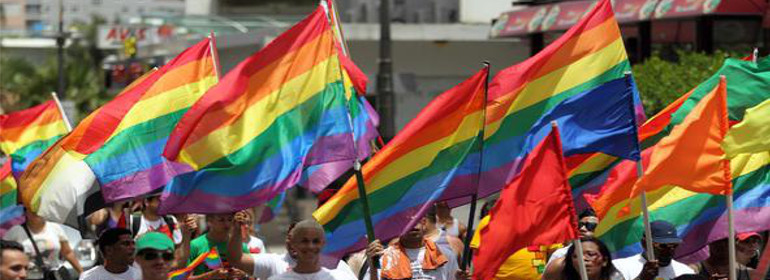With the world in flux and the far right on the rise, we must continue to fight, says Andy Kane.
This November marked a year since marriage equality became the law of the land in Ireland, a year in which gay marriage has gone from being questioned and contested to being a normal part of Irish life.
Even the term ‘gay marriage’ feels obsolete and those who voted No have quietly returned to their lives, finding the fabric of the ‘traditional Irish family’ intact, unaffected by the outcome of the referendum. I got married myself this year and it would be easy for me to use this space to talk about what makes a marriage work and how important it is to maintain a sense of self while learning how to compromise, something I have personally grappled with.
Post Marriage Equality
However, so much has happened in the world since we got what we so dearly wanted that it feels selfish and almost futile to dwell on the minutia of my domestic experience. Instead I want to focus on where we as queer Irish people find ourselves now, a year after marriage equality – where do we go from here?
The referendum was an incredibly emotional time for our country. As queer people we were forced to reexamine our community, our view of ourselves, and our place in society. With the legitimacy of our relationships being scrutinised, the stress of waiting to see if we would be accepted by our countrymen took its toll, but it also forced our community to become politically activated in a way many of us never had been before. We took this opportunity to become a part of the narrative.
Whether you felt that the Yes campaign’s ‘normalisation’ of gay relationships for the sake of courting votes delegitimised the reality of our queerness, or understood this was a necessary tactic used to persuade heterosexist society that we were fundamentally the same, doesn’t matter – the campaign ignited a sense of justice and political activism in many of us who had grown accustomed to feeling voiceless.
Igniting the activist within
For months we fought, queer people and straight allies alike, navigating misinformation and an imposed media ‘balance’ that wasn’t balanced at all. We took to the streets, we put up a fight, we used every tactic that we had to get the message across, and then we won. We won! The feeling of alienation that we faced for decades simply trying to live our lives began to evaporate.
We were finally equal, or at least it appeared that way. The truth is we aren’t equal at all. My friend Becca, a straight ally who canvassed for the Yes campaign, spoke to me of how her understanding of culturally ingrained homophobia grew clearer as her question: “How are you going to vote?” was met with uncomfortable silence, and how exhausting it became to see skewed messages of No campaign posters everywhere.
Late to the ‘White Male Privilege’ Realisation
Of the many people who canvassed for my right to marry, how many are women now locked in a battle for body autonomy? It dumbfounds me when I realise that as a white gay man, I am now ‘more equal’ than Irish women who canvassed for my rights.
Our victory in the referendum was wonderful, but rewarding rights that were withheld from us is also a pacification that can distract us from the responsibilities that come with winning. Swathed in acceptance we may find it easier to assimilate – it’s all too easy to get comfortable – but 2016, I’m sure you’ll agree, has been one of the strangest, most upsetting, and at times straight-up frightening, years that I can remember.
The world feels out of whack; decades of progress seem illusory. Around the globe minority rights are as threatened as ever; the validity of trans identities are questioned, women’s reproductive rights are under attack, black lives are being stolen while nationalists and covert white supremacists are being elected to office. With Brexit and the surprise election of Donald Trump we are all heading into uncharted territory. I worry that those already living radical lives, existing on the fringes of society, will be pushed further and further out as conservative agendas rise at an alarmingly exponential rate.
Still not equal
Now more than ever we have to maintain the strength it took to fight for our rights. We have to use that strength to reach out and stand with those still on the battlefront. Equality cannot not exist wholly unless it exists for everyone.
As we become more accustomed to our new standing in Irish society, our community must remain conscious and politically active to show that love is still the most powerful force we have. We must show up for other causes outside of our own; we must rally for those who are yet to be recognised and respected.
We must not allow assimilation to dull our warrior cries. Now is the time to take what we’ve learned and use it to make the world more accepting for anyone still struggling to come out of the shadows.
© 2016 GCN (Gay Community News). All rights reserved.
